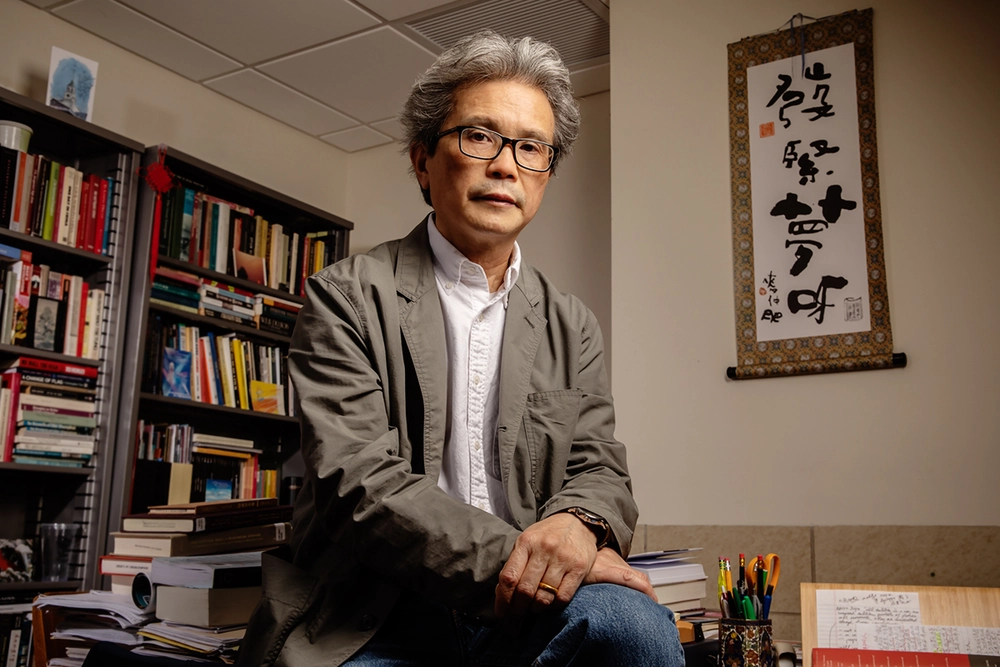
Hong Kong has been through more than 100 days of protest, often in the form of human chains, “Lennon Walls” of spontaneous free expression and violent clashes with police. University of Illinois history professor Poshek Fu was raised in the former British colony and has written much about it, especially its prolific film industry. His current book project, “The Cultural Cold War in Hong Kong,” examines the city’s central importance as a Cold War cultural battleground. Fu spoke with News Bureau social sciences editor Craig Chamberlain.
What makes Hong Kong such a unique place?
Since it became a British colony in 1842, Hong Kong had long been the world’s gateway to trade with China. Following the Communist sweep across the mainland in 1949, China’s new leaders, though anti-imperialist, allowed continued British rule of this southernmost city in order to have a window to the capitalist world. Its rapid industrialization after that was in part a result of the U.S.-led trade embargo against China during the Cold War. Up until the 1990s, China got over 60% of its foreign currency from the colony. Similarly, the U.S. and its allies used the colony as a watchtower to monitor “Red China.”
For the British, Hong Kong was a borrowed city with borrowed time. It claimed neutrality in the turmoil of global conflicts and tried not to provoke China. It legitimized its rule by boasting the rule of law and made moneymaking its reason for existence. Since many different political interests coexisted side by side in Hong Kong, freedom of expression was tolerated. The colony enjoyed freedom, but not democracy; was cosmopolitan, but also deeply attached to Chinese tradition. It was caught in the middle between China and the free world, and that caused deep anxiety in the people’s self-identity.
The city was handed over to China in 1997. Even as China has become the second-largest economy of the world, Hong Kong has remained the largest source of the country’s foreign investment. Under the “one country, two systems” policy governing China’s relationship with Hong Kong, its people are more eager than ever to preserve their freedom and economic well-being, and to gain the democratic right to choose their government.
This protest movement is only the latest in a series since the handing over 22 years ago. What links these protests together? And what’s behind the added fervor of this one?
The current anti-extradition bill protest movement has a prehistory that stretches back to at least 2003, when a rally against the national security law drew an estimated half-million people into the streets. What links all these protests together, for the vast majority of participants, is the aspiration to have a clear boundary between the two systems of life under China and the right to choose their leaders.
There are several characteristics that make the current protest special, especially in comparison to the 79-day Umbrella Movement in 2014. It is a leaderless, social media-driven movement with fluid, guerrillalike tactics; it has sustained for over 100 days with extensive support, or at least sympathy, from the city’s population; and it has attracted enormous international attention.
You note that Hong Kong was once the “Hollywood of the East,” producing hundreds of films a year for various Chinese audiences. Why there? And how did that fit within the city’s larger cultural significance?
In its most general sense, this began with the shift of the capital of Chinese-language cinemas from Shanghai to Hong Kong after 1949. Specifically, it refers to the period from the 1960s to early 1990s when Hong Kong was the world’s second- or third-largest exporter of film and dominated the region’s film industries.
It started as the colony’s cinema was caught up in the Cold War contest for the hearts and minds of ethnic Chinese across the globe. Rapid modernization, both of technology and business organization, and the expansion of distribution circuits occurred as pro-Beijing and “free” film studios and U.S. propaganda agencies competed for influence. This competition and expansion paved the way for the golden age of Hong Kong cinema in the 1960s-1990s.
What are the factors mostly likely to determine the city’s future?
Hong Kong’s major challenges will be in rebuilding trust between the people and the government and the people and police, and also among the people so polarized by their political views on the other. Passage of the proposed Hong Kong Democracy and Human Rights Act in the U.S. Congress promises to contribute to the prevention of further erosion of the boundary between the two systems. At the same time, if it is a new Cold War now, Hong Kong will certainly be a battlefield between the U.S. and China.
Reprinted with permission from the Illinois News Bureau
Original may be found here: https://news.illinois.edu/view/6367/803185